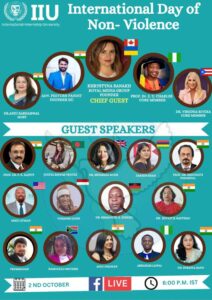Today, as we celebrate Gandhi Jayanti, we reflect on the legacy of one of the greatest leaders the world has ever known—Mahatma Gandhi. Born on October 2, 1869, in Porbandar, Gujarat, Mahatma Gandhi remains a beacon of hope, peace, and justice. His philosophy of nonviolence, or Ahimsa, and truth, or Satyagraha has transcended borders and inspired movements worldwide. But as we stand here today, we must ask ourselves—how can we truly honor Gandhi’s legacy in today’s world?

The answer lies in adopting his policies, not just as a commemoration, but as a fundamental way of governance, diplomacy, and global interaction. We must urge the heads of all nations to embrace Gandhi’s ideals, as they hold the potential to create a world of harmony, equity, and sustainability.
Mahatma Gandhi once said, “An eye for an eye will only make the whole world blind.” In an era where conflicts and wars continue to rage, and where global tension escalates every day, this message is more relevant than ever. World leaders must adopt nonviolence not merely as a tool for resolving conflicts, but as a principle to shape their policies. Diplomacy, negotiation, and dialogue must become the pillars of international relations, replacing aggression and hostility. If all nations prioritize peace, we can collectively create a world free from the threat of war.
Gandhi’s principle of Sarvodaya, or the welfare of all, is another policy that should guide the decisions of world leaders. Economic disparity, poverty, and inequality plague our world today. Despite the immense wealth generated globally, millions still live in extreme poverty. Gandhi’s vision of economic and social justice can help bridge this gap. Leaders must focus on policies that uplift the most marginalized, ensuring that every citizen has access to basic needs like education, healthcare, and employment.
We cannot forget Gandhi’s emphasis on self-reliance, which should inspire today’s global community to promote sustainable development. Gandhi envisioned a world where local communities are empowered to sustain themselves, and where exploitation of natural resources is minimized. In a time when environmental degradation threatens the very survival of our planet, Gandhi’s ideals are a blueprint for sustainable living. If world leaders embrace this policy, we can ensure that development does not come at the cost of our environment. Climate change is a global concern, and following Gandhi’s model of simplicity and conservation could pave the way for a greener, healthier planet.
Moreover, Gandhi’s concept of universal brotherhood—the idea that we are all interconnected—calls for global cooperation and unity. Nations should not work in isolation but collaborate to tackle issues like poverty, disease, and climate change. Gandhi believed that we must recognize our shared humanity, and today, this belief is key to addressing the challenges we face on a global scale.
In conclusion, Mahatma Gandhi’s policies are not relics of the past, but timeless principles that can guide the future. If the heads of all countries adopt his ideals of nonviolence, Sarvodaya, self-reliance, and universal brotherhood, we will see a world that is not only peaceful but also just, sustainable, and united. As we celebrate Gandhi Jayanti, let us not merely remember the man, but also commit to following the path he laid out for us.





